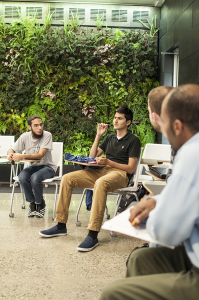Organization offers students the ability to express their religion
By Forest Lassman

The college has a large Islamic population, and the Muslim Students Association (MSA) is a group created for those students.The MSA has weekly meetings where students can discuss and learn about Islam. The atmosphere is friendly and open – sometimes food shared – with integrated ideas and videos.
Malek Barakat, the president of the group, enjoys this open format.
“People like to discuss things rather than have a lecture,” Barakat said. “We had a time before where we would assign someone or they would sign up for a topic about the religion, but we noticed that was a little boring for some people so we’ve changed things [to a more open format].”
These meetings focus on the positives of the world, covering topics such as finding spiritual moments and happiness. Videos of speakers such as Mohammed Ali are shown and discussed, and everyone is encouraged to speak their mind.
The weekly meetings are far from everything the MSA does.
“[Islam is] living a life of faith, but it’s shown through your actions,” said student Brett Cooper.
To represent these actions, the MSA holds many other activities, running everything from clothing drives to picnics.
“We’ve had several events with different clubs,” Barakat said. “Last year, we had [a presentation] with the Organization of Black Collegians where we worked together to show the movie ‘Malcolm X,’ and we worked with several other clubs in a bake sale to fund-raise for different charities.”
Discrimination of Muslim students could be a problem, but Barakat feels the school is very helpful.
“People [at the college] are more aware of what Islam is,” Barakat said. “They understand the difference between the actual religion and what’s the stereotype that the media might represent.”
A meditation room in COM 309 is also open for students to pray in, and Arsalan Abdul-Khalaq, student, finds this very helpful.
“When I first came here I was one of the Muslims who had just found a location to pray, and prayed there. Eventually, I was spotted by another Muslim… and he informed me that we have a location for prayer. He took me to the meditation room, and I never had [something like] that before,” said Abdul-Khalaq.
Even with help and education, Muslim students sometimes face misunderstandings or discrimination because of their religion.
The most common of these misconceptions is over the headscarf some Muslim women wear.
“The point of the hijab or the head-cover is a requirement for Muslim women, but it is not something they are forced into doing,” said Abdul-Khalaq. “Some women don’t do it… but no man is coming along and forcing them into doing it. They are doing it out of their own free will.”
The MSA meets Tuesdays from 2-3 p.m. and also holds Jumu’ah prayers for those not able to go to a mosque on Fridays.






















